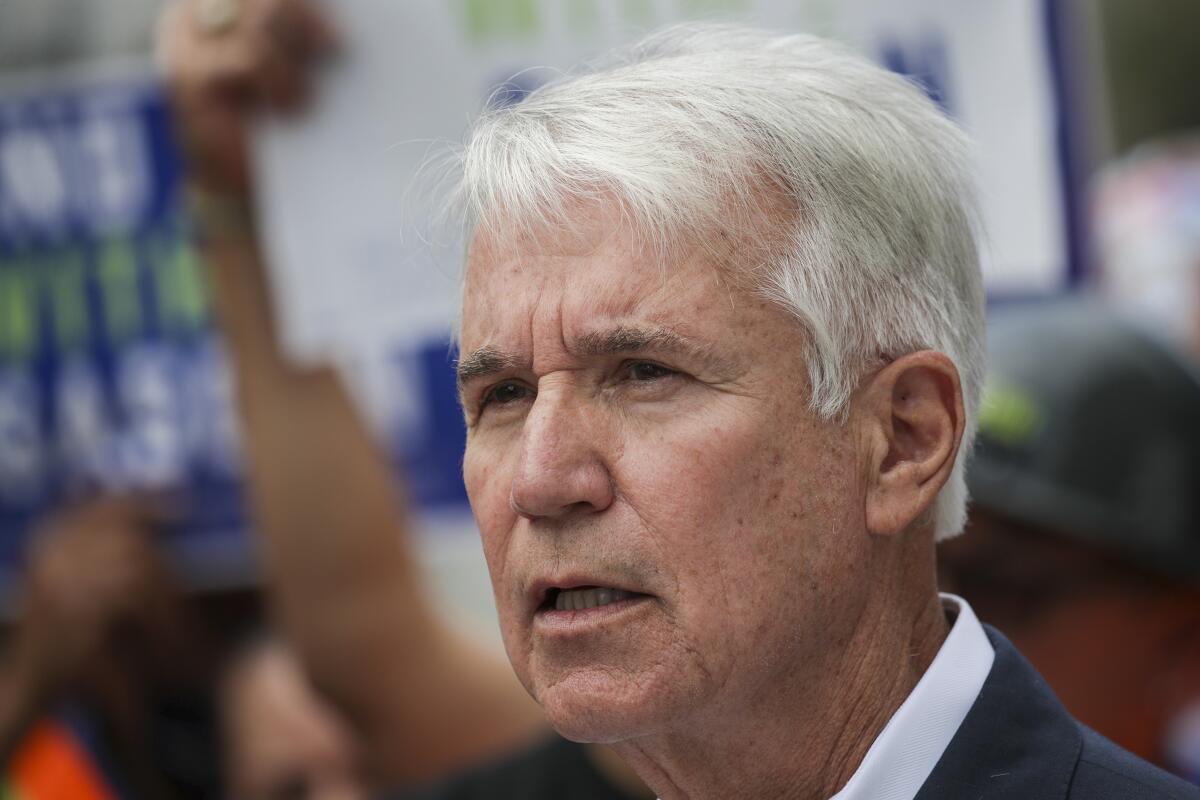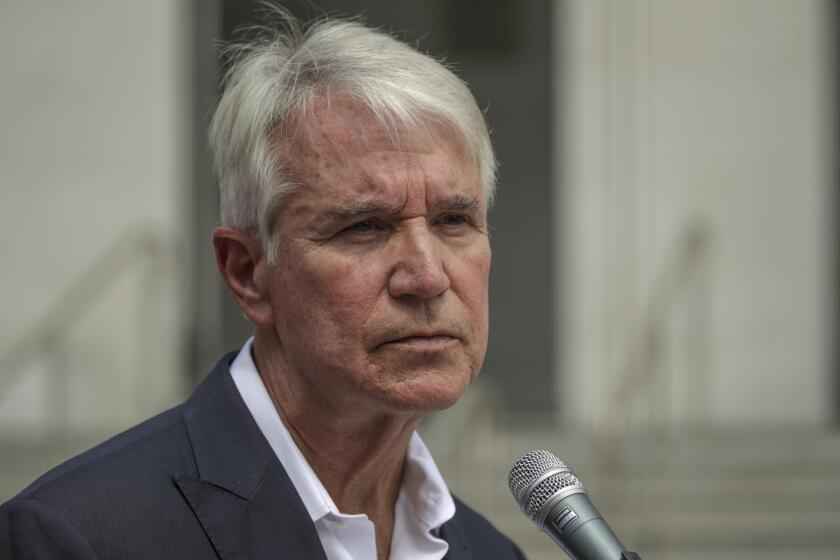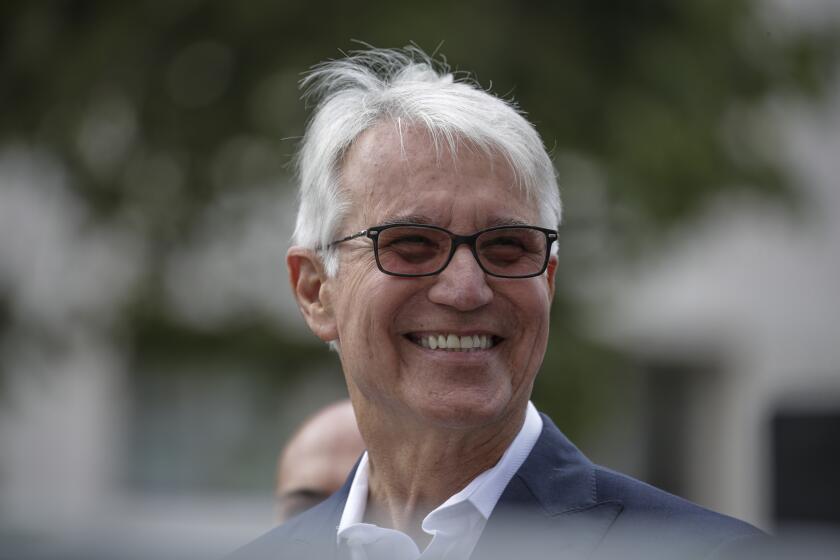Why L.A. D.A. Gascón reversed himself on sentencing of woman who assaulted 10-year-old

- Share via
As he’s faced increased criticism from law enforcement, elected officials and his own staff, Los Angeles County Dist. Atty. George Gascón has staunchly defended his handling of a politically fraught case: the prosecution of a transgender woman charged with sexually assaulting a child in a Denny’s restroom.
Gascón insisted as recently as last week that he was right to allow 26-year-old Hannah Tubbs to plead guilty in juvenile court, where her sentence was two years behind bars. Tubbs was 17 at the time of the attack, and Gascón told a reporter Wednesday that, in keeping with his policy of not trying juveniles as adults, he thought “the Tubbs case still does not belong in adult court.”
Then Sunday evening, deep into a long holiday weekend, the reform-minded prosecutor made a dramatic shift. In an emailed statement, Gascón said his approach was incorrect: “The complex issues and facts of her particular case were unusual, and I should have treated them that way.”
The sudden reversal came after Gascón’s staff learned that Fox News was preparing to publish jailhouse recordings in which Tubbs crowed about receiving a light sentence and spoke derisively about the victim, a 10-year-girl she attacked in a Palmdale bathroom.
Line prosecutors told The Times the turnabout was especially galling because the jail recordings have been known inside the district attorney’s office for at least a month and did not alter Gascón’s approach previously.
“He knew Fox was going to run with those tapes. It was damage-control time,” said a frequent critic, Eric Siddall, a deputy district attorney who is vice president of the union representing line prosecutors.
In an interview Monday afternoon, Gascón said he first learned of the recordings Thursday through an email from a Fox News journalist. He described himself as “very, very upset” and disgusted with Tubbs, who he said had taken advantage of his office, by among other things, potentially identifying as transgender in a bid to get more lenient treatment.
“It’s unfortunate that she gamed the system,” Gascón said. “If I had to do it all over again, she would be prosecuted in adult court.”
On Monday, after Fox News published a story, The Times obtained written summaries of unsettling phone calls Tubbs placed to her father and others that offer additional details. A person who has heard the recordings confirmed the validity of the summaries. That person spoke on the condition of anonymity because they were not authorized to discuss the case with the media.
In a major shift, L.A. County’s top prosecutor said he will allow his office to seek life sentences and to try juveniles as adults in some cases.
The calls were made between late November and mid-January. Most of the comments were made after Nov. 30, when Tubbs entered a guilty plea in juvenile court but before her sentencing was finalized. She frequently discussed her relief at being treated as a youthful offender. In a November call, Tubbs told her father not to bother coming to her plea hearing because it would last “2.3 seconds.”
“I lucked out because it’s not an adult case, it’s a juvenile case or else I would be looking at life,” she told her father last month.
Tubbs did not actually face a life sentence, but under Gascón’s policies, juveniles can face only one criminal count at a time. If tried as an adult, she would have faced up to five criminal counts and a much lengthier prison term, court records show.
Tubbs repeatedly taunted law enforcement she suspected of listening in on the calls, used racial slurs and offered a callous, disturbing description of her victim.
“I was young, and I was hungry for some meat,” she said.
The victim, who has moved out of state and is still receiving therapy, released a statement Sunday describing the assault as “beyond horrible.”
“Not only do I have to live with that awful memory for the rest of my life, but I’m also given no true justice as to what happened to me,” she said.
Tubbs assaulted the girl in the restaurant bathroom in 2014, grabbing her by the neck and locking her into a stall. At the time, Tubbs had not transitioned to female and went by a male name. She was also charged under that name. The crime went unsolved until 2019 when DNA evidence pointed to Tubbs, who had by then amassed an adult record of arrests for battery, assault, drug possession and other crimes.
Gascón, formerly San Francisco’s district attorney, rode into office the next year on the surge of concern about racial inequality and mass incarceration that followed the murder of George Floyd. Citing scientific studies showing that adolescent brains aren’t fully developed until age 25, he vowed not to try juveniles as adults, and the Tubbs case presented him with an early opportunity to make good on that promise.
While the case against Tubbs was initially filed by former Dist. Atty. Jackie Lacey, it was moved to juvenile court under Gascón’s policies.
L.A. County Sheriff Alex Villanueva, Supervisor Kathryn Barger and others lambasted Gascón for not charging Tubbs as an adult. There was some evidence that Tubbs was mentally ill and had developmental delays, according to an email obtained by The Times last month, and Gascón also voiced worries that she would be more vulnerable to violence as a transgender woman in an adult facility.
L.A. County Dist. Atty. George Gascón on Wednesday touted what he considers the accomplishments of his first year, but found himself getting into tense exchanges with reporters about recent high-profile crimes.
Tubbs’ public defender previously declined to comment on the case.
In the recordings, Tubbs also instructs her father on how she wants to be identified in court.
“Make sure when you come to court you address me as her. I know it will be hard, but you have to do it,” she said, according to a summary reviewed by The Times.
Deputy Dist. Atty. Shea Sanna, who prosecuted the case, said he got access to the jail calls Jan. 20, and two of Gascón’s top aides, Chief Deputy Dist. Atty. Sharon Woo and special advisor on juvenile policy, Alisa Blair, were aware of the content of the recordings.
“They demanded the recordings from me like three weeks ago,” Sanna said, referring to what he called “upper management.” He was removed from the case the day after notifying superiors of the existence of the recordings, a move he considers retaliation for comments to the media about the case.
Another top Gascón aide, Alex Bastian, denied Sanna’s account.
He said that Woo and Blair “may have known there are jail calls … but they did not know there were jail calls that were very disturbing in nature.”
But rumors of the contents of the calls were circulating among prosecutors for weeks. The hearing where Sanna wanted to make them public was held on Jan. 27th, three weeks before Gascón said Fox contacted him. Sanna said he notified his supervisors of the contents of the calls before the hearing.
Sanna was ultimately blocked from playing the calls in court by a judge, who said they were not relevant to the disposition hearing.
Despite their disturbing content, the recordings were unlikely to affect Tubbs’ case. She took a plea deal on Nov. 30, two months before prosecutors became aware of the jail calls. At her sentencing hearing, a juvenile court judge could sentence her only to probation or the two years in juvenile custody she wound up receiving.
Gascón said that though he did not publicly acknowledge the tapes until Monday, he began taking steps late last week to address his policy on juveniles to prevent future cases like Tubbs’.
On Friday, he announced new committees to evaluate “extraordinary” cases where a defendant’s conduct might require adult prosecution. High-ranking prosecutors and members of Gascón’s executive team would decide how to proceed with these outlier cases, he said.
“Exceptional cases cannot create overall policy,” he said.
Critics have been quick to question his motivations. The policy changes came not only in the uproar following the Tubbs case, but also as political pressure intensified around his office.
Campaign finance records showed that a revitalized effort to recall Gascón from office has already raised $1.8 million, more than what was raised last year, in an initial attempt that failed. The union that represents rank-and-file prosecutors is also expected to vote to endorse the recall this week.
Former LAPD Chief Charlie Beck, a longtime friend of Gascón and one of his lone supporters among law enforcement, also rescinded his endorsement last week.
Times staff writer Laura Newberry contributed to this report.
More to Read
Sign up for Essential California
The most important California stories and recommendations in your inbox every morning.
You may occasionally receive promotional content from the Los Angeles Times.














